İÇ İÇE: A political space for new Anatolian music
The festival for new Anatolian music, İÇ İÇE, returns to Berlin next week. It sees itself as a political and artistic space for migrant, queer, and marginalized perspectives.
The festival for new Anatolian music, İÇ İÇE, returns to Berlin next week. It sees itself as a political and artistic space for migrant, queer, and marginalized perspectives.
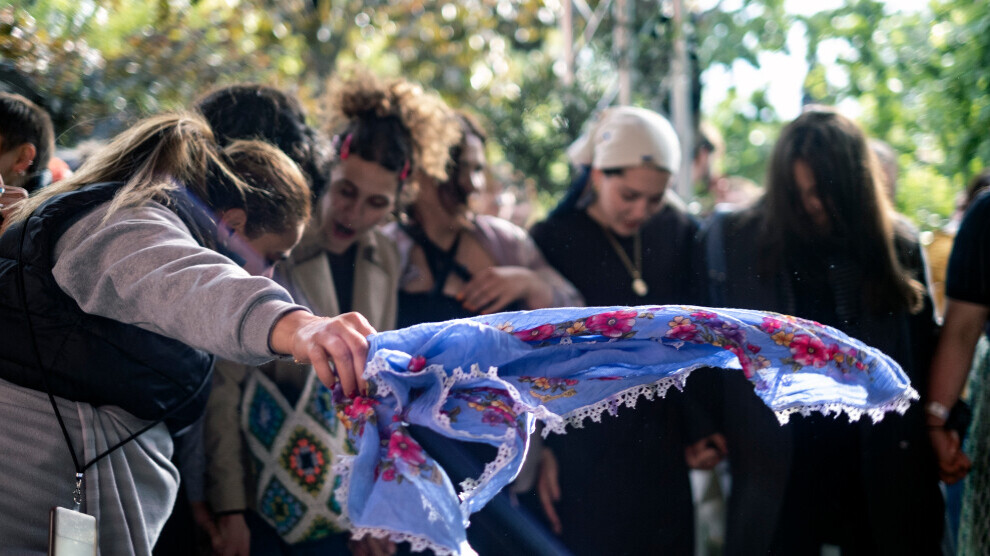
İÇ İÇE, which means “interwoven” in Turkish, is Germany’s first and only festival for new Anatolian music with a focus on diversity. The festival sees itself as both a political and artistic space that centers migrant, queer, and marginalized perspectives. Founded in 2020 by Melissa Kolukisagil, the 2025 edition will be its fifth and will take place on June 14 at Festsaal Kreuzberg in Berlin.
İÇ İÇE doesn’t just organize concerts and club nights. It also hosts solidarity events. Most recently, on January 31, 2025, it held a fundraiser for Heyva Sor a Kurdistanê (Kurdish Red Crescent) “in response to the targeted attacks by the Turkish military on civilian infrastructure in Rojava,” as the festival explained in a statement.
The festival has since grown beyond Berlin: as a touring format, İÇ İÇE has been held in cities like Hamburg, Munich, Cologne, and Heidelberg. This year, for the first time, it is operating without public funding, and the team is calling for financial support to keep this self-organized space independent and rooted in solidarity.
In this interview, founder Melissa Kolukisagil talks about the origins of the festival, political responsibility, and what it means to curate new Anatolian music.
Melissa, do you remember the moment when it became clear to you: a festival like İÇ İÇE is missing – and I want to change that?
Yes, but it wasn’t a single moment – it was the result of a long process. I had already been living in Berlin for seven years and was deeply immersed in the techno scene – first as a guest, later as a booker and organizer. Over the years, I spent countless nights at the same parties, with the same people, sounds, and concepts. At some point, I realized that this scene was stuck in a loop. It wasn’t moving. That was especially true before the pandemic. And it excluded many of us.
Spaces like these were never made for people like us. To participate, I constantly had to leave parts of myself at the door – as a cis woman, as a queer person, as a person of color, as someone from a working-class family. I learned how to move without standing out. But eventually, I no longer wanted to do that. I wanted a place where I could feel whole, with all parts of me.
At the same time, I was exhausted by the working conditions in the cultural sector – so often shaped by sexism and exploitation. I felt like I had to function within a system that offered me no real space. My desire to create something of my own kept growing. A place that not only feels different but builds fundamentally different structures.
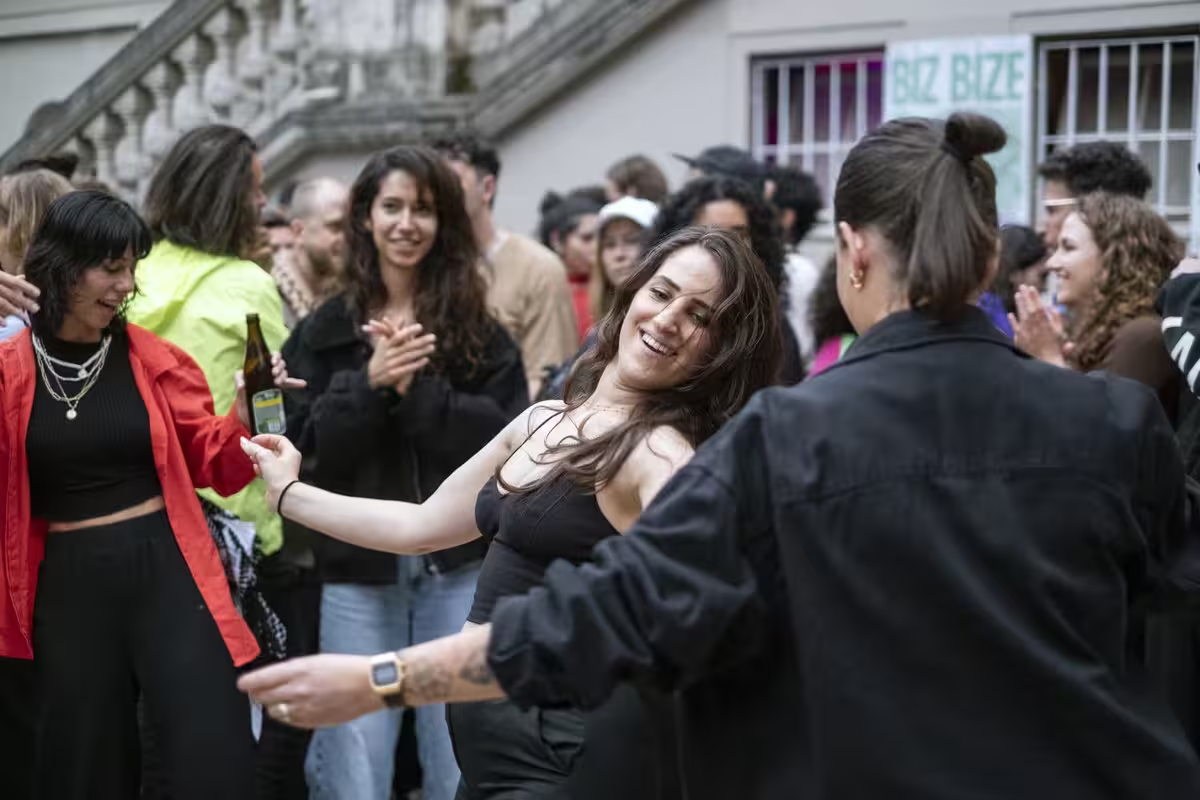
You’ve described İÇ İÇE as “a gap.” What exactly was missing from the cultural landscape at the time?
I just never really saw myself reflected in the cultural scene. I missed a representation that wasn’t just symbolic but complex, contradictory, alive. I longed for a space that wasn’t geared toward a white gaze, but toward our own needs. A space that didn’t ask: “How do I fit in here?” but rather: “How do I want to unfold?”
With İÇ İÇE, I created a space that I myself could grow into. That was my starting point. A space that isn’t finished but evolves with us. One that doesn’t demand explanations but listens. The fact that this space now works for many others too is a gift, but not a coincidence.
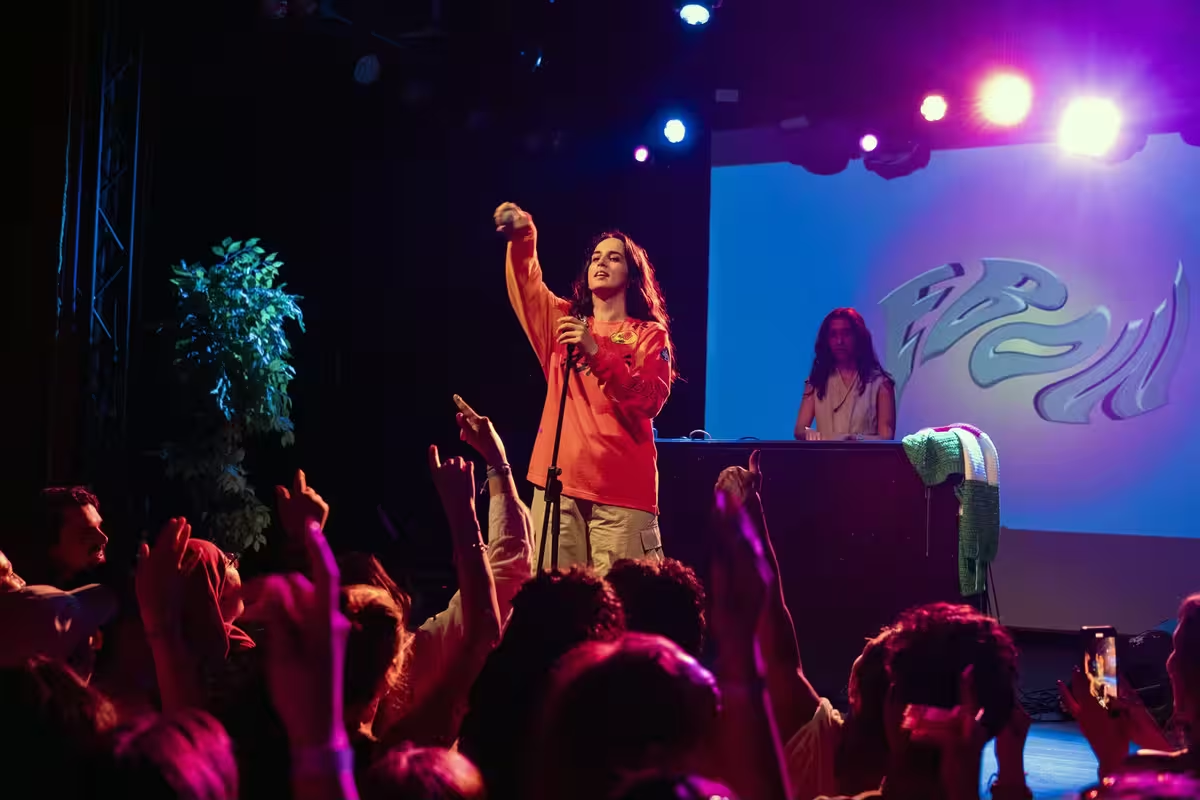
How much of yourself is in this festival? What experiences, desires, or frustrations shaped it?
İÇ İÇE is a deeply personal project and that’s its strength. It resonates because it stems from experiences that many of us share. I grew up in the Black Forest, to the sound of my mother’s sewing machine, metal concerts, Turkish TV, and wedding halls. For a long time, I tried to leave all that behind, because it reminded me of my loneliness.
Later, I learned to listen to myself: What do I want to carry forward, what do I leave behind? What hurts, and what empowers? İÇ İÇE was born from exactly these questions.
So İÇ İÇE is much more than just music. What does it mean to you emotionally and politically to curate this space?
To me, it means taking responsibility for my own story, and for the stories that are too often ignored, silenced, or exoticized. But it also brings deep joy. Every year, I feel lucky to be able to showcase the incredible artists connected to İÇ İÇE.
Politically, my curatorial practice is about deliberate overstatement. I try not to respond to existing norms, but to create new ones – and to do so naturally.
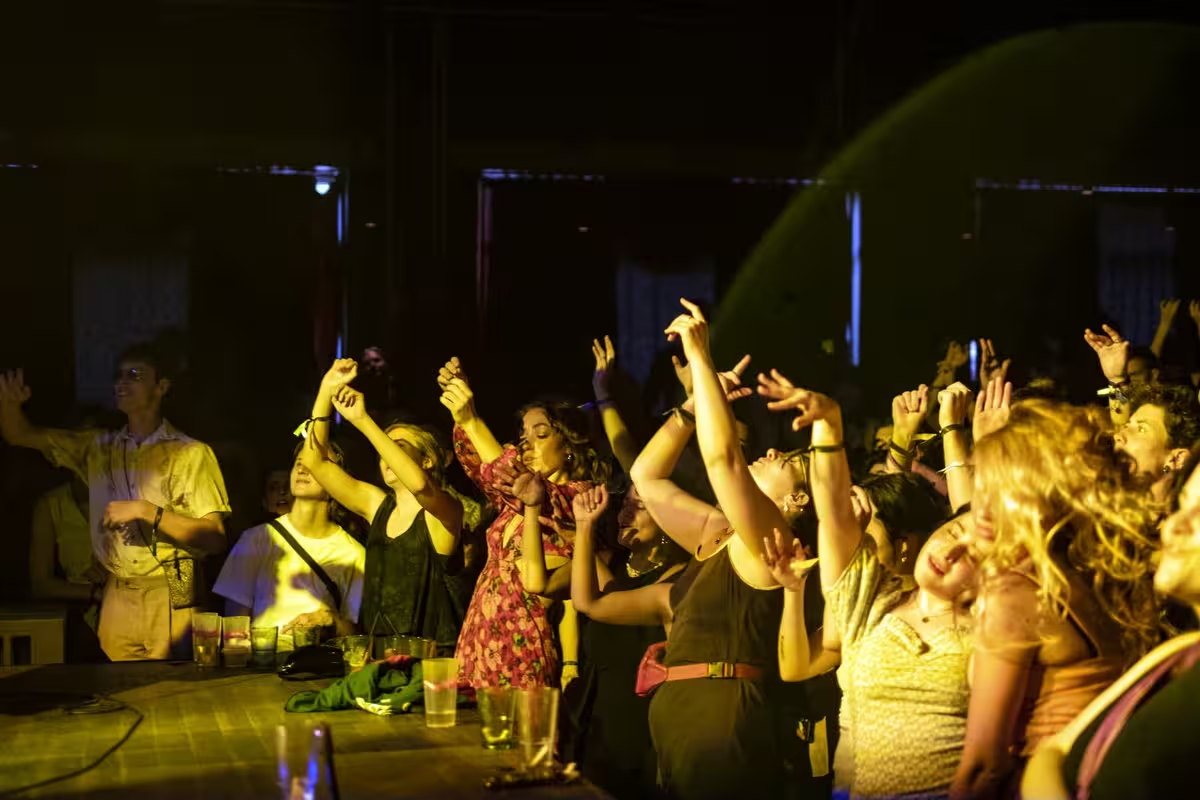
What does “contemporary Anatolian music” mean to you, and how would you explain it to someone who’s never heard it?
For me, “contemporary Anatolian music” isn’t just a stylistic term. It’s about something radically alive. It’s music that has roots in Anatolian, Kurdish, Armenian, Alevi, Greek, Jewish, or Arab traditions and lives in the present. It speaks of migration, identity, loss, and resistance. And it does so not with nostalgia, but through transformation.
What happens when the saz meets the synthesizer? When does the third generation tell their version of grief and defiance? That’s where the “contemporary” begins. It’s about ruptures, reinterpretations, and the right to tell our own stories; not just to preserve them, but to evolve them.
Why was it important for you to explicitly include Kurdish music? What perspectives does that open up?
Because no festival that seriously engages with Anatolian music can be credible without making Kurdish voices heard. Kurds have been systematically silenced in Turkey and in the diaspora. That repression continues to this day.
At İÇ İÇE, we create spaces where marginalized voices are not decorative, they are central. Including Kurdish music isn’t a gesture; it’s a position against silence, against the repetition of exclusion.
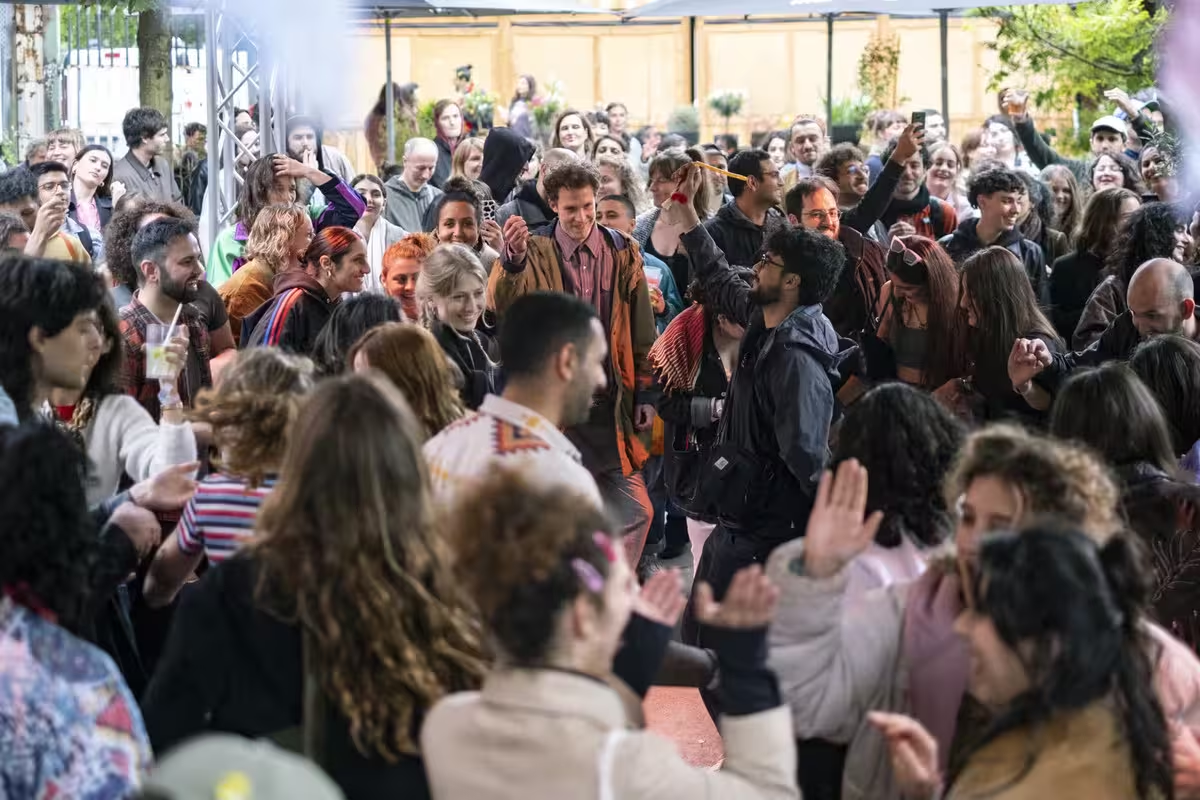
On January 31 you organized a benefit event for Heyva Sor. Why was this solidarity action so important to you?
Because we didn’t want to remain silent in the face of the Turkish government’s attacks on Rojava, bombing hospitals, schools, water facilities. Thousands are fleeing; the humanitarian situation is catastrophic. Heyva Sor provides emergency aid under extremely difficult conditions.
At the same time, we see how Kurds are harassed, criminalized, and silenced even here in Germany. As a festival rooted in resistant, migrant communities, we see it as our responsibility to create safe spaces for all those affected by oppression from the Anatolian region.
“İç içe” means “interwoven.” How does this principle show up concretely in the lineup and program?
“İç içe” isn’t just a name – it’s the festival’s core principle. This interweaving happens on every level: stylistically, biographically, politically. We bring together artists who, at first glance, seem very different. A queer DJ from Berlin meets a singer with Alevi roots, a performance artist with refugee experience meets Kurdish hip-hop. These aren’t just collages; they’re real, organic connections. It’s not about showcasing diversity, it’s about showing: This all belongs together. And so much more.
The audience is also interwoven. Migrant kids, queer communities, people with refugee experiences, anti-racist alliances, they all come together with their stories, contradictions, and longings. This collective presence, without needing to adapt or explain yourself, is for me the political heart of İÇ İÇE.
When I founded the festival, I mainly wanted to show that Anatolian music is part of German cultural history, that it belongs here, naturally. Migrant artists have been shaping this society for decades, even as they’re structurally overlooked.
At the same time, I wanted to challenge expectations: What does an “Anatolian festival” sound like? What images come to mind when people think of Anatolia? I wanted to dismantle those stereotypes – also because I myself was still shaped by a white gaze at the beginning. That’s no longer my concern. Now it’s about showcasing new forms that emerge from our experiences. Forms that don’t need to justify themselves, but own themselves.
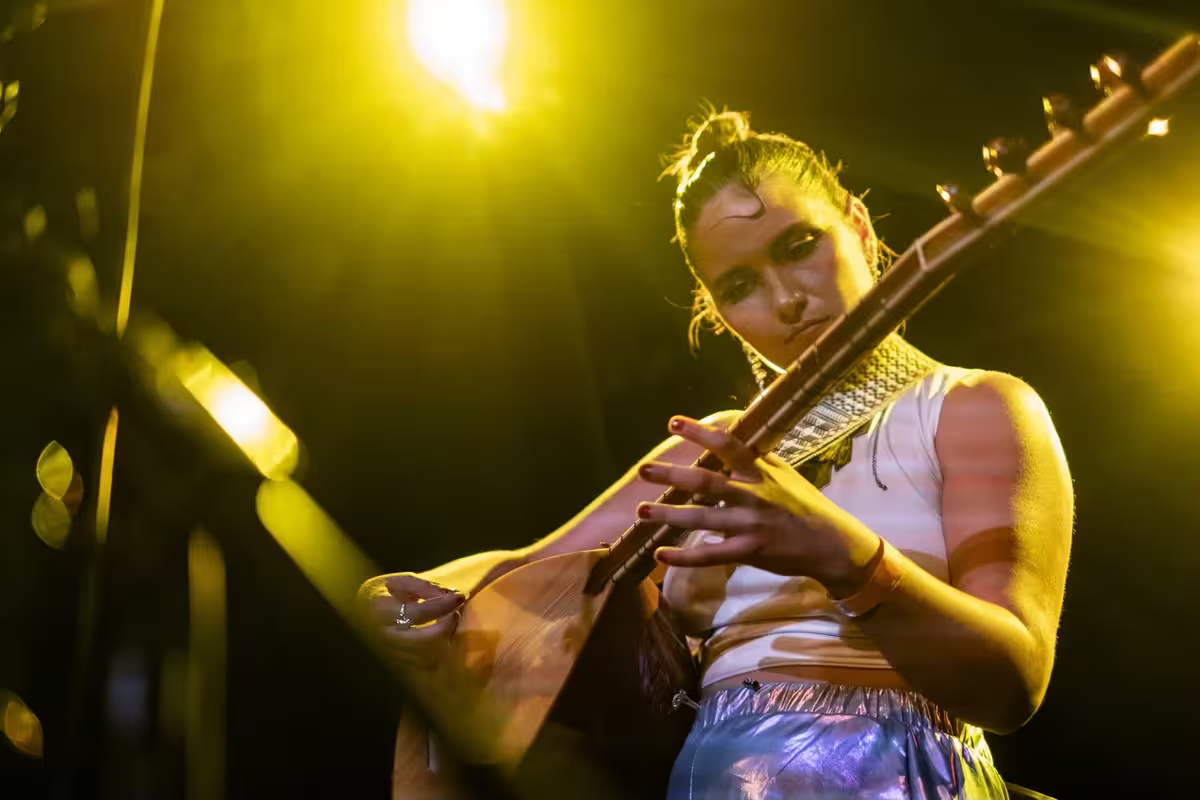
To what extent is İÇ İÇE also a response to racism, exclusion, or cultural homogenization?
In the evening we were supposed to launch the first edition of the festival in 2020, nine people were murdered in Hanau in a racist attack. What happened afterward – how quickly everything returned to normal, how little changed – shook me deeply. That was the moment I let go of the white gaze for good. I didn’t want to create a festival that needed to explain or justify itself anymore, but one that speaks from within us.
The emerging concept of İÇ İÇE was a direct response to that structural violence and became a declaration of resistance against cultural homogeneity and dominant narratives. A space that doesn’t just say: “We belong,” but: “We help define what belongs.” The decision not to cancel the festival after Hanau, but to say: now more than ever, that wasn’t symbolic. It was necessary. It was clear: this country must include us, with all our ruptures, stories, and complexity.
A month later the pandemic hit, and we had to pause. But during that collective retreat, in that political and emotional state of emergency, everything we had experienced seeped even deeper into the structure of İÇ İÇE. These experiences became part of our identity, part of the attitude with which we work.
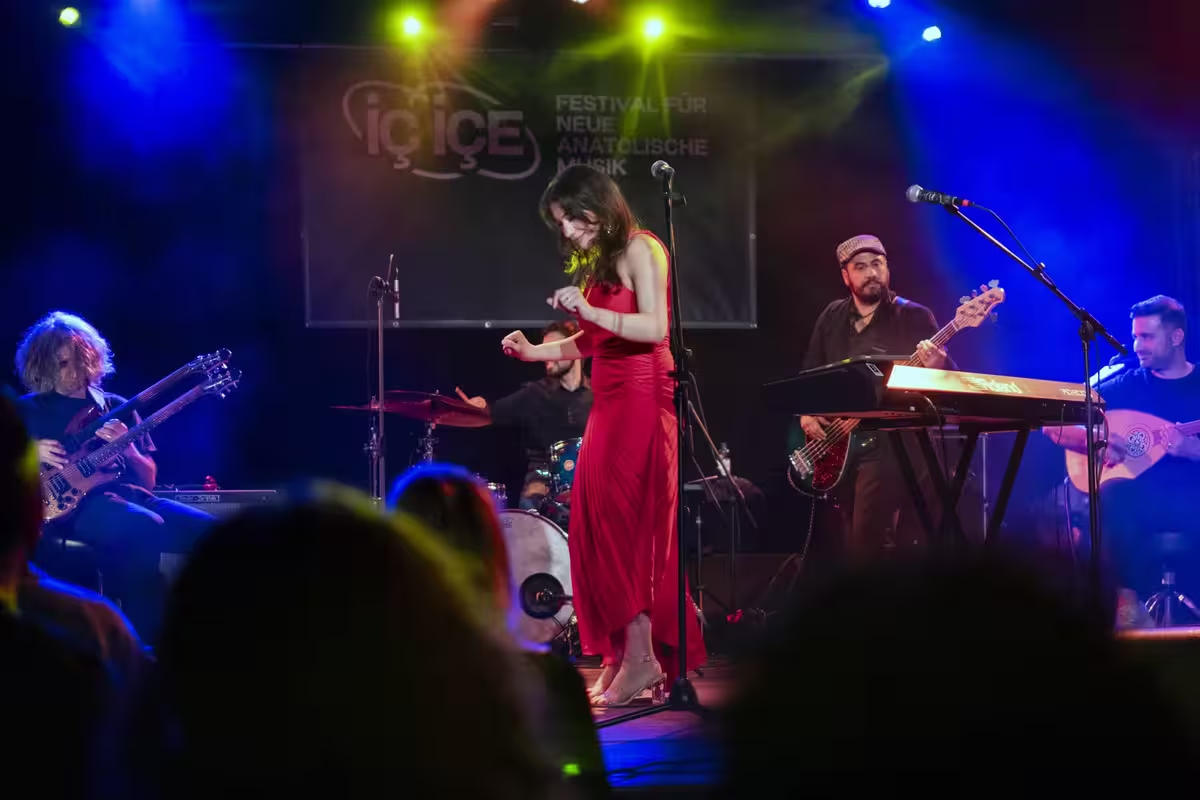
What challenges come with organizing such a diverse and consciously political festival, especially within the cultural sector?
The cultural sector is still dominated by white, academic structures. A migrant, queer, explicitly political festival like İÇ İÇE is often not seen as a natural part of cultural life, but quickly exoticized or deemed “too political.” At the same time, it’s sometimes used as a token. Funding frameworks often fall short; they don’t grasp the emotional, political, and curatorial depth of our work. Our limited resources and our ambition to be there for our communities year-round are often in tension.
Challenges are also growing internally. The more visible we become, the more diverse our audience gets, and so do their expectations. It’s no longer just the folks who’ve been with İÇ İÇE from the start or who are already politically aligned. We now also attract people who are unfamiliar with our values and codes. That’s not a problem, but it takes effort and attention.
That’s why our awareness concept and Code of Conduct aren’t fixed rules but living documents. They grow with us, they breathe. We try to take responsibility in the best way we can, but we miss things too. And we name that. Learning is central to our ethos. Diversity also means friction and holding that tension without forcing harmony is part of our commitment.
What’s your vision for İÇ İÇE in five or ten years?
I hope we can continue for a long time and keep expanding the touring concept of İÇ İÇE. Right now, a lot is uncertain: this was the first year we had to pull off the festival without any funding. It was exhausting but we did it, thanks to our community and crowdfunding.
In the long term, I hope we can build sustainable structures for ourselves as a team and for our work. And who knows, maybe one day there will be an İÇ İÇE edition abroad.
How can people support you?
Our crowdfunding campaign is still open; we’re currently facing a funding gap of around €3,000. Every donation helps enormously!
We also welcome invitations to other cities and are open to collaborations, especially to keep our touring concept alive and growing.
But most of all, one can support us by buying a ticket, coming to İÇ İÇE, and celebrating with us. We need this moment of coming together more than ever, to feel that all the struggle has been worth it.
https://www.betterplace.org/de/projects/150184-ic-ice-festival-2025
https://anfdeutsch.com/kultur/IC-ICe-ein-politischer-raum-fur-neue-anatolische-musik-46579
Photos © İÇ İÇE | Ceren Saner & Joanna Schröder